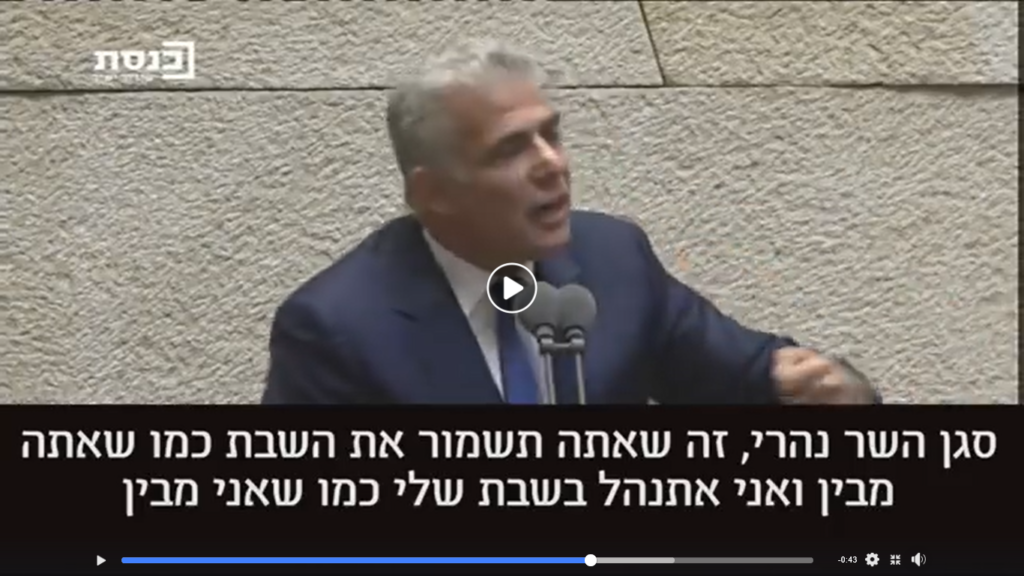
Israel MK Yair Lapid, the leader of the Yesh Atid party, recently took to the podium of the Knesset to blast the Netanyahu government for its refusal, in his view, ever to say “no” to the political and monetary demands of the ḥaredim. Perhaps the most dramatic part of his speech (see the clip) touches upon the ongoing dispute over the nature of public (i.e., legally required) Shabbat observance in Israel. Lapid as we’d expect from a “secularist” (ḥiloni) politician, argues against religious coercion. I agree with you, he tells a ḥaredi government minister, about the importance of Shabbat to the Jewish people. But *you* do not get to define Shabbat for *me*. Just as I would not tell you how to observe Shabbat in your home and your neighborhood, so you shouldn’t tell me how to observe Shabbat where I live! He is saying, in so many words, that Judaism is a personal thing. I and no one else – and definitely not Orthodox rabbis – am entitled to make my own religious decisions as to how I shall practice Judaism in personal space.
As good Jewish religious liberals who condemn anything that smacks of religious coercion, we applaud Lapid’s words. But before we cheer him too loudly, let’s consider the implications of his words (though his intent may be different). If we read him literally, Lapid is describing an unbridgeable gap between two irreconcilable worldviews. On the one side is modernity, with its classical liberal commitment to the sanctity of individual freedom. Faith, according to this worldview, is entirely a private matter; it is up to each of us to decide for him/herself whether and how to practice religion. On the other side is the Orthodoxy represented by the ḥaredi government minister, a Judaism defined by a system of mitzvot and חיובים (obligations) that makes no room for freedom of choice. In that world, religion is most definitely not a private matter but something compulsory, a set of proper behaviors determined by halakhah, the Jewish legal tradition as interpreted by the proper (read: Orthodox) authorities. If this is what Lapid really means, namely that the two worldviews are mutually exclusive, then we have no alternative but to stand on one side of that gap or on the other. And as liberals, our choice ought to be obvious.
We at the Freehof Institute are uncomfortable with this one-side-or-the-other approach. Yes, we are liberals, proud citizens of the culture of modernity, and champions of individual freedom. At the same time, we do not believe that individual freedom is an end in itself. To put this differently, we are Jews as well as liberals. And as Jews, we are in search not only of the right to make our own religious decisions – a right that as moderns we already possess – but of substance, a rich and meaningful Jewish life. And since Judaism is and always has been a practice-centered faith, the source of that substance is the halakhah – yes, the Jewish legal tradition with all its talk of mitzvot and obligations –that body of thought and writing in which Jews for nigh on to 2000 years have argued and worked out their decisions about sacred practice. For serious liberal Jews to reject halakhah is therefore self-defeating, not a viable option. What we require, rather, is a halakhah that speaks to the modern spirit, a “liberal” or “progressive” halakhah (hence our name!) that offers a life of Jewish substance and meaning to Jews who stand on *our* side of that supposedly unbridgeable gap.
In other words, it’s not an either-or choice between modernity and halakhah. We can have both. To spread that message is the work of the Freehof Institute, a mission based upon our commitment to two fundamental truths: first, that there is no such thing as “Judaism” without halakhah, and second, that halakhah is too important to be left to the exclusive control of the Orthodox rabbinate.